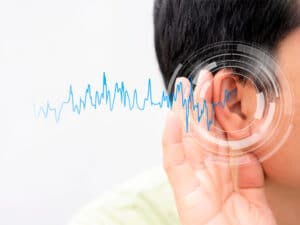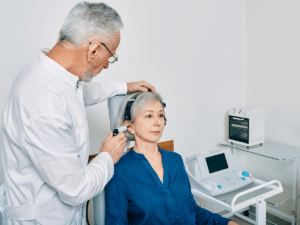Living with tinnitus can be a challenging and distressing experience. The persistent ringing, buzzing, or hissing sounds that characterize this condition can disrupt our daily lives, hinder our concentration, and even affect our emotional well-being. If you’re reading this, chances are you or someone you care about is seeking information and guidance on tinnitus. Rest assured, you’ve come to the right place.
As specialists in Tinnitus Treatment in Westchester, we will delve into the intricacies of tinnitus, exploring its causes, symptoms, and, most importantly, effective management strategies. Our goal is to provide you with a comprehensive understanding of this condition, empowering you to take control and find relief.
Understanding Tinnitus
Tinnitus is a condition characterized by the perception of sound in the absence of any external source. It often manifests as a ringing, buzzing, humming, or hissing sound in the ears. While it is commonly associated with hearing loss, this condition can also occur in individuals with normal hearing. The sounds experienced can vary in pitch, intensity, and duration and may be present in one or both ears.
Tinnitus can be broadly categorized into two main types: subjective and objective.
Subjective tinnitus is the most common type, where only the affected individual can perceive the sounds. It is often associated with damage or dysfunction in the auditory system, such as the inner ear or auditory nerve.
Objective tinnitus, on the other hand, is relatively rare and can be heard by both the affected individual and a healthcare professional during an examination. It is typically caused by a physical source, such as blood vessel abnormalities or muscular contractions, which generate sound that can be measured.
Tinnitus is a prevalent condition that affects people of all ages, although it becomes more common with advancing age. According to studies, approximately 15% of the global population experiences some form with varying degrees of severity.
Demographically, tinnitus can affect individuals across different backgrounds and lifestyles. While it is more commonly reported in older adults, it can also impact younger individuals, particularly those exposed to loud noises or with certain medical conditions.
Common misconceptions about tinnitus
Tinnitus is surrounded by several misconceptions that can hinder understanding and management of the condition. Let’s address a few of these misconceptions:
- Tinnitus is purely a psychological issue: While emotional factors can influence the perception and impact of tinnitus, it is not solely a psychological condition. It often has underlying physiological causes related to the auditory system or other medical conditions.
- There is no treatment or relief for tinnitus: Although there is no universal cure for tinnitus, there are various management strategies and treatment options available to alleviate its symptoms and improve quality of life. It’s essential to seek professional help and explore appropriate strategies tailored to individual needs.
- Tinnitus is always a sign of hearing loss: While tinnitus and hearing loss are often interconnected, not everyone with tinnitus experiences hearing impairment. This condition can arise from various causes, and its relationship with hearing loss can vary from person to person.
Causes of Tinnitus
Tinnitus can arise from various factors, ranging from exposure to loud noises to underlying medical conditions. Understanding the causes of tinnitus is crucial in identifying the appropriate management strategies. Let’s explore the different causes:

A. Noise-induced
Exposure to excessively loud noises, whether in occupational or recreational settings, can damage the delicate structures of the inner ear. This damage can disrupt the normal functioning of the auditory system, leading to tinnitus. Prolonged or repeated exposure to loud music, machinery noise, or explosions can contribute to the development of noise-induced problems.
Certain professions, such as construction, manufacturing, and entertainment industry roles, involve consistent exposure to high levels of noise. Additionally, recreational activities like attending loud concerts or using personal listening devices at high volumes can also increase the risk of developing noise-induced tinnitus.
B. Age-related
As we age, the auditory system undergoes natural changes, including the gradual degeneration of hair cells and nerves in the inner ear. This age-related degeneration can contribute to the development of tinnitus.
The degeneration of the auditory system, particularly the cochlea and associated structures, can disrupt the normal processing of sound signals, leading to the perception of tinnitus in older individuals.
While age-related degeneration is a primary factor, other age-related health conditions, such as cardiovascular issues or certain medications, can further contribute to this condition in older adults.
C. Medical conditions and medications
Tinnitus can be a symptom of various underlying medical conditions. These may include Ménière’s disease, temporomandibular joint (TMJ) disorders, otosclerosis, ear infections, and certain tumors. Understanding and addressing these conditions can help manage this condition effectively.
Some medications, including certain antibiotics, nonsteroidal anti-inflammatory drugs (NSAIDs), diuretics, and cancer medications, have been associated with tinnitus as a potential side effect. It’s essential to consult with a healthcare professional about any medications that may be contributing.
D. Other causes
- Earwax blockage and its relationship to tinnitus – Excessive earwax buildup can obstruct the ear canal, affecting the conduction of sound waves and potentially leading to tinnitus. Proper ear hygiene and seeking professional assistance for safe earwax removal can help alleviate associated symptoms.
- Temporomandibular joint (TMJ) disorders – Disorders affecting the temporomandibular joint, which connects the jawbone to the skull, can sometimes cause tinnitus. Misalignment or dysfunction in this joint can lead to referred sensations and tinnitus.
- Head and neck injuries – Traumatic head or neck injuries can damage the auditory system, resulting in tinnitus. The impact can range from temporary to chronic and more severe cases.
What are the Symptoms?
Living with tinnitus goes beyond the perception of persistent sounds. It can have a profound impact on various aspects of our lives. Let’s delve into the symptoms associated with this condition:
A. Perception of sound
The hallmark symptom of tinnitus is the perception of sound when there is no external source present. These sounds can vary in nature and intensity, ranging from ringing, buzzing, or hissing to clicking, humming, or roaring. The perceived sound may be constant or intermittent, and its volume can fluctuate.
B. Impact on daily life
Tinnitus can significantly impact our daily lives. The constant presence of sound can make it challenging to focus on tasks, concentrate, or engage in conversations. It may interfere with work or academic performance and affect our ability to relax and enjoy leisure activities. Sleep disturbances are also common among individuals with this condition, leading to fatigue and reduced overall well-being.
C. Emotional and psychological effects
The emotional and psychological effects of tinnitus should not be overlooked. The persistent nature of the condition can lead to feelings of frustration, irritability, anxiety, and even depression. The constant presence of sound can be distressing and can create a sense of helplessness or loss of control. It is important to address these emotional aspects and seek support to maintain emotional well-being.
D. Associated symptoms (e.g., dizziness, headaches)
In some cases, tinnitus may be accompanied by additional symptoms. Dizziness or vertigo can occur, especially if it is associated with underlying conditions such as Ménière’s disease. Headaches or migraines may also be reported by patients, although the exact relationship between the two is still being studied.
It is crucial to understand that the impact of tinnitus can vary from person to person. Some individuals may experience mild symptoms that do not significantly disrupt their daily lives, while others may find it profoundly distressing and seek immediate relief. Recognizing the symptoms and their effects is an important step in seeking appropriate management strategies and finding relief from tinnitus.
Management Strategies
Living with tinnitus can be challenging, but there are various strategies that can help minimize its impact and improve overall well-being. Let’s explore some effective management strategies:
A. Lifestyle modifications
- Noise avoidance and protection: Minimizing exposure to loud noises and using ear protection in noisy environments can prevent further damage to the auditory system and reduce the intensity.
- Stress management techniques: Stress can exacerbate the symptoms, so incorporating stress reduction techniques such as meditation, deep breathing exercises, and regular exercise can help manage tinnitus-related stress.
- Healthy sleep habits: Establishing a consistent sleep routine and creating a conducive sleep environment can improve sleep quality, which in turn can alleviate tinnitus-related sleep disturbances.
B. Sound therapy and masking
Sound therapy involves using external sounds to distract from or mask the perception of tinnitus. By providing a soothing background noise, it can help reduce its prominence. Using devices that emit white noise, nature sounds, or personalized soundscapes can provide relief and make this issue less noticeable.
For individuals with hearing loss and tinnitus, hearing aids that amplify external sounds while providing masking sounds specific to this condition can be beneficial.
C. Cognitive Behavioral Therapy (CBT)
CBT is a therapeutic approach that helps individuals develop coping strategies to manage the emotional and psychological impact of tinnitus. This therapy helps individuals recognize and reframe negative thoughts and emotions associated with it, promoting a more positive mindset.
CBT equips individuals with practical coping techniques, such as relaxation exercises, mindfulness, and problem-solving skills, to better manage tinnitus-related distress.
D. Medications and medical interventions
In some cases, medications may be prescribed to alleviate tinnitus symptoms or address underlying conditions contributing to it. These may include antidepressants, antianxiety medications, or medications targeting specific causes. It’s important to discuss potential side effects and considerations with a healthcare professional before starting any medication for this condition.
Tinnitus retraining therapy (TRT), along with other specialized treatments like neuromodulation techniques, may be recommended in certain cases to retrain the brain’s response to this condition and reduce its perceived intensity.
Coping with Tinnitus
Managing tinnitus involves not only physical strategies but also emotional support and self-care. Consider the following coping mechanisms:
- Support networks and counseling services: Seek support from family, friends, or support groups that can provide understanding and empathy. Professional counseling services can also help address the emotional impact of this condition.
- Online resources and communities: Utilize reputable online resources and engage in online communities to connect with others experiencing tinnitus, share experiences, and gain valuable insights and coping strategies.
- Importance of self-care and self-compassion: Prioritize self-care activities that promote relaxation, such as engaging in hobbies, practising mindfulness, or pursuing enjoyable activities that distract from tinnitus.
- Promoting overall well-being: Focus on maintaining a healthy lifestyle, including a balanced diet, regular exercise, and good sleep hygiene. Managing stress, engaging in activities that bring joy, and maintaining social connections can contribute to overall well-being despite the presence of this condition.
Find Relief at Listen Hear Diagnostics

If you or someone you know is struggling with tinnitus, don’t hesitate to seek professional help. At Listen Hear Diagnostics, Our Audiologist in Westchester offers consultation, evaluation, and effective treatment. Our experienced team understands the impact this condition can have on your life and is dedicated to providing personalized care.
Located at 161 Central Park Ave, Hartsdale, NY, we offer a range of treatment options, including hearing aids and TRT; we can help you find relief from the symptoms. Contact us or visit our website to learn more about our services.








